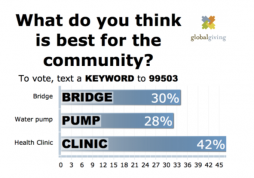monitoring and evaluation
Posted by MohiniBhavsar on Sep 02, 2010
Design of a Randomized Trial to Evaluate the Influence of Mobile Phone Reminders on Adherence to First Line ARV in South India data sheet 1871 Views
Author:
Ayesha De Costa, Anita Shet, Nagalingeswaran Kumarasamy, Per Ashorn, Bo Eriksson, Lennart Bogg, Vinod K Diwan, the HIVIND study team
Abstract:
[Adapted from Abstract]
This paper presents a year long study protocol for a trial, to evaluate the influence of mobile phone reminders on adherence to first-line antiretroviral treatment in South India (Chennai and Bangalore).
Researchers plan to enroll 600 treatment naïve patients for first-line treatment as per the national antiretroviral treatment guidelines at two clinics in South India. Patients will be randomized into control and intervention arms. The control arm will receive the standard of care; the intervention arm will receive the standard of care plus mobile phone reminders.
Each reminder will take the form of an automated call and a picture message. Reminders will be delivered once a week, at a time chosen by the patient. Patients will be followed up for 24 months or till the primary outcome i.e. virological failure, is reached, whichever is earlier.
Self-reported adherence is a secondary outcome. Analysis is by intention-to-treat. A cost-effectiveness study of the intervention will also be carried out.
A step-by-step outline of designing a 24-month long trial to determine effectiveness of phone reminders for anti-retroviral adherence.
Posted by MohiniBhavsar on Sep 01, 2010
The HAART Cell phone Adherence Trial (WelTel Kenya1): A Randomized Controlled Trial Protocol data sheet 2521 Views
Abstract:
Background: The objectives are to compare the effectiveness of cell phone-supported SMS messaging to standard care on adherence, quality of life, retention, and mortality in a population receiving antiretroviral therapy (ART) in Nairobi, Kenya.
Methods and Design: A multi-site randomized controlled open-label trial. A central randomization centre provided opaque envelopes to allocate treatments. Patients initiating ART at three comprehensive care clinics in Kenya will be randomized to receive either a structured weekly SMS (’short message system’ or text message) slogan (the intervention) or current standard of care support mechanisms alone (the control). Our hypothesis is that using a structured mobile phone protocol to keep in touch with patients will improve adherence to ART and other patient outcomes. Participants are evaluated at baseline, and then at six and twelve months after initiating ART. The care providers keep a weekly study log of all phone based communications with study participants. Primary outcomes are self-reported adherence to ART and suppression of HIV viral load at twelve months scheduled follow-up. Secondary outcomes are improvements in health, quality of life, social and economic factors, and retention on ART. Primary analysis is by ‘intention-to-treat’. Sensitivity analysis will be used to assess per-protocol effects. Analysis of covariates will be undertaken to determine factors that contribute or deter from expected and determined outcomes.
Discussion: This study protocol tests whether a novel structured mobile phone intervention can positively contribute to ART management in a resource-limited setting.
Posted by MohiniBhavsar on Aug 13, 2010
Family Planning via Mobile Phones: Proof-of-Concept Testing in India (CycleTel) data sheet 3165 Views
Author:
Katherine Sarah Lavoie, Victoria H. Jennings, Meredith Puleio, Priya Jha, Rebecka Lundgren
Abstract:
Results of proof-of-concept testing for an mHealth solution for reproductive health in Uttar Pradesh, India. The text messaging tool based on FrontlineSMS, is a family planning service that relies on the Standard Day Method system of birth control. This method of birth control depends on the woman's fertility cycles to avoid pregnancy. Women can text the date of their menses and user receives their fertility status. Additionally, women can receive information about other family planning options, and support. Presented are observations on the appropriatenss of the technology from focus group discussions. The authors share the input given by target users in the product and service design. Women tested the solution to give insight on feasibility and design.
Posted by MohiniBhavsar on Aug 10, 2010
Mobile Monitoring and Evaluation: Experiences from Pilot to National Scale Implementation data sheet 2211 Views
Author:
Eben Conley, Sarah Brown, Kieran Scharpey-Schafer
Abstract:
Implementation of Monitoring and Evaluation (M&E) programmes are predominantly dependant on paper forms to measure organisational impact. These forms are then manually captured into an electronic system for analysis. This methodology results in high costs, questionable data accuracy and long turnaround times. Additionally inadequately skilled employees, remote locations and high staff turnover add to these challenges. A solution that allows for flexibility and extendibility within the NGO sector is required to decrease costs and allow for NGO’s to focus their attentions on their main areas of expertise. One potential solution is the use of mobile phones to collect the data.
This paper presents the experiences of implementing a mobile phone based M&E system and the lessons learnt in scaling this system from pilot to national. These include system flexibility, easy-to-learn interfaces, identification of champions and detailed site assessments. Today the system is being used nationally, with over 70 000 electronic surveys submitted and over 300 facilitators using the system.
Posted by on Jan 01, 1970
n/a
Posted by admin on Oct 31, 2009
Guest post by Christine Martin, Tufts University.
The potential for mobile technology to impact development has been researched and reported on in areas ranging from job matching services to financial inclusion. More and more development agencies are adopting mobile communications in their programmes in innovative ways. However, there is a lack of research on how mobile technology is being used to monitor and evaluate programs in the field.

